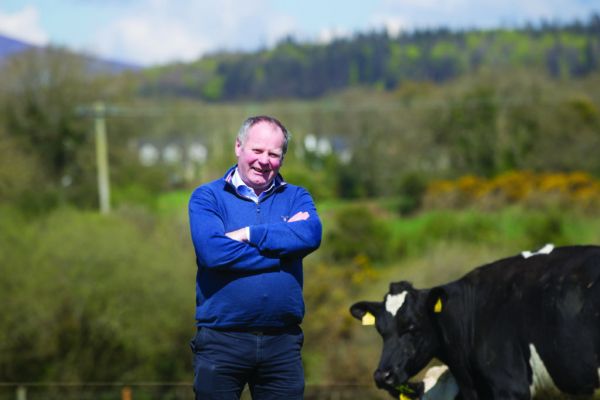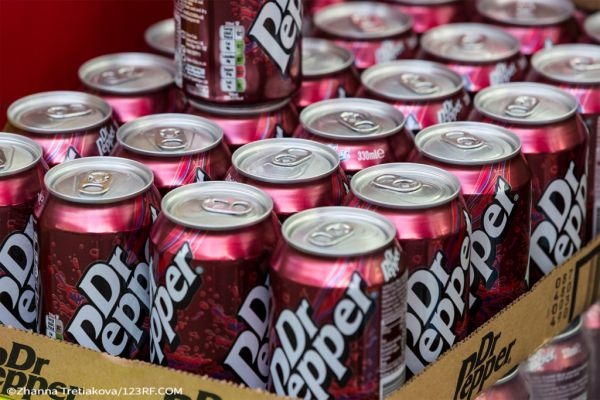It has been a great year for well-known and much-loved Irish brand Killowen Farm. In the latest profile in our Meet the Makers series, sponsored by Love Irish Food, managing director Nicholas Dunne talks to Maev Martin about an exciting NPD pipeline, investing in a cream cheese facility, and rolling out an extremely successful re-brand.
The Killowen Farm brand typically achieves 10% organic sales growth year-on-year, but this year Nicholas is predicting that growth will be closer to 20%. “We are attributing a lot of that growth to the re-brand because retailers are now more interested in our brand,” he says.
“They like the colours and the design because it really stands out on shelf, and we are finding that it is attracting new, as well as existing, customers. It is a look that is very different to our competitor brands, and we now have a wider audience buying into the new brand. Previously, Co. Wexford-based Killowen Farm appealed largely to an older audience, but the new packaging seems to be attracting a younger cohort. Consumers are turning to the Killowen Brand for that luxury treat in the yogurt category.”
The re-brand was launched on the market via the Love Irish Food programme’s Bloom festival in May and digital street advertising displays at supermarkets and shopping centres around the country.
“We have also done quite a bit of promotion on Facebook, a lot on Instagram, and a little on Twitter,” he says.
“We definitely get a sales bounce every time we do Bloom. To us, it is an incredibly important festival because it gives us the opportunity to meet a lot of customers who have been buying our product and that gives us the feedback that we need to further develop the business. They tell us what they think and how we have performed over the past year. We have loyal customers who are honest with us, so we get invaluable information at events like Bloom.”
Nicholas describes branding as “an evolutionary process”, where a business is responding to trends in the market, as well as to the developments that are happening in its own operation.
“We felt the brand wasn’t reflecting the message that we wanted to communicate to our customers – Killowen Farm is local, sustainable, gut- friendly and natural, but our branding wasn’t reflecting that. Now we are getting very positive feedback from our customers who are telling us that the rebrand looks great and is more successful at communicating our brand story.”
Green Credentials
‘Metres not Miles’ is the core message in Killowen Farm’s current advertising campaign.
“We decided to put this message front and centre of our campaign because it triggers a conversation with our customers,” he says.
“Some people are asking us what the tagline means, and this gives us an opportunity to tell them our story – where our farm is, how our dairy is located beside our factory, how we are pumping the milk in the dairy about seven metres from the farm. We felt that ‘Metres not Miles’ was a catchy and very apt message because this product comes from the family farm and our food miles are very low. There has been a lot of public discourse about food miles over the last number of years, and we can confidently claim that we aren’t talking about miles, but metres!
“Our farm is on-site and everything, including our milk, is produced on-site. We are employing a lot of our workforce from the locality, and while the factory creates a certain amount of liquid waste, we are able to spread that back out onto our land, and into our soil. These are all factual claims that we can substantiate, but we have more to do. For example, we will be installing solar power at the factory over the next few months. We have a lot of roof space and we consume power on a 24-hour, seven-days-a-week basis, so installing solar panels is an obvious next step as our payback will be quite quick.”
Most of Killowen Farm’s packaging is either made from recyclable material or is fully recyclable.
“All our plastic cups are made from polypropylene, which contains some recyclable elements, but it is 100% recyclable,” he says.
“We use a lot of glass, which is also 100% recyclable, and 40% of that glass is recycled glass. Of course, there is still a huge energy cost to produce the glass and there is no solution to that yet. A lot of work is being done to come up with a solution and we will adopt it as soon as it becomes available to the market!”
New Product Development
In May, Killowen Farm opened its cream cheese facility following an investment of €4 million.
“We spent a number of years developing cream cheese and this has resulted in a totally natural product, unlike most of the cream cheese products in the market, which use thickeners, gums and gelatine,” he says.
“We have developed a process that increases the protein content in the product, and protein is a great thickener, so that has allowed us to dispense with the gums and gelatine. There is no retail cream cheese manufacturer in Ireland – the leading brand is Philadelphia – so we saw an opportunity. Cream cheese across Europe forms about 50% of the spreads market. In Germany, half of the spreads market is in butter and half is in cream cheese. We are also finding that cream cheese carries flavour very well and it is very convenient – you can put it into a pasta sauce and use it as a dip – so it is a versatile product with a lot of potential.”
Killowen Farm cream cheese is being sold in the German market at the moment.
“Once we established a market for it in that country, we knew that we would launch it in Ireland,” he says.
Killowen Farm are planning to launch a natural cream cheese product, as well as a sweet cherry pepper product, in the Irish market in September.
And they have more NPD in the pipeline.
“We will be launching a traditional crème fraiche and a sour cream in the Irish market before Christmas,” he says.
“We have based both products on an old French recipe that we had in Killowen Farm. The crème fraiche recipe was developed and never used, and we developed the sour cream recipe ourselves based on an old recipe that was tweaked slightly. We distributed the crème fraiche to a number of chefs who think it is better to cook with and delivers more flavour than a lot of the products that are currently on the market.”
Sustainability & the Irish shopper
While the escalation in food pricing is front of mind for shoppers, Nicholas believes that the environment is still an important, if secondary, focus.
“Where people can afford to switch, they are making the switch to more sustainable products,” he says.
“Grocery spend is coming down across Europe because money is tightening and that is because everything has suddenly gone up in price. The main focus for consumers is to get value for money and budget for food, but I think consumers are still making a conscious decision to buy local products.
“The sustainable product is often the more expensive product, and if this inflation crisis was happening 10 or 15 years ago, the shopper behaviour would have been solely dictated by price. However, it isn’t just about cheap food anymore. There is a strong cohort of consumers that will continue to opt for the healthier options. This was accelerated during the pandemic and that mindset will remain. Shoppers are happy to buy less food, but they want quality food that is healthy, with better-for-you credentials. They want quality over quantity. The messaging around the environmental issue is incredibly strong, so I think it will remain an important consideration for shoppers. The need to support locally-produced food brands for the long-term benefit of the food industry is definitely in the consumers' subconscious."
But are they likely to shift significantly away from brands, including local brands, and towards own-label products if inflationary pressures worsen?
"There will be some shifting from it, but I think local brands have built a strong reputation in recent years, so they may come out of this even stronger, especially those with a focus on quality and sustainability," he says.
"As long as they maintain their standards, they will win this battle. While brands may cost that little more, they will, and should, be better. There are strong private label brands that will gain a bit of market share, but in the main, we would be fighting to grow our brand's presence and continue to grow volume."
Rising costs
The current inflation crisis is having a major impact on Killowen Farm, as it is on all producers and businesses across the country.
“We try to work with the retailers as much as possible and they are doing their best,” he says.
“With normal inflation year-on-year, you can work it through the supply chain and the hit is usually quite small, but the difficulty this time is that some of the ingredients that we are buying in have more than doubled in price, so neither the retailer nor ourselves can absorb that cost increase, which means it has to be passed on. We have now reached a point where we have absorbed as much of the inflationary cost as possible, as has the retailer, and it is being passed on to the shopper.”
Nicholas reports that the base milk price has jumped from 32 cent a litre, and he says that by winter it will be at 64 cent a litre.
“That is a doubling of milk prices in a year to 18 months and it is not sustainable for us to take that on,” he says.
“The fruit harvest across Europe and in Ireland has become very scarce. Raspberries have doubled in price, the cost of growing strawberries has increased, and vanilla has become very expensive, as have mangos. We use up to 10% fruit in our standard yogurts, and in the premium products, it could be up to 20% fruit, so the lack of resources to harvest fruit and the cost of growing the crops, is impacting on our operation.”
While he is hopeful that we have come through the worst of the inflationary spiral, he believes that the current food costs crisis won’t be resolved in a matter of months. “It will be more like years,” he says.
“There is no evidence to support food pricing coming down in the short term. A re-set button has been pressed. For many years, food was quite cheap relative to take home pay, but that has changed. A larger percentage of take-home pay will be required to cover grocery costs, and that scenario will be with us for quite some time.”
Love Irish Food
Killowen Farm has been part of Love Irish Food for the past three years, and Nicholas says that membership of the organisation has been “hugely beneficial” to the business.
“Love Irish Food is an extremely professional and well-run organisation that is doing a great job in delivering a very positive message about Irish food,” he says. “Their branding is very strong, and they are playing a big part in communicating the importance of buying Irish brands. As a member, we are committed to playing our part in promoting Irish-produced products, as well as our own products.”
Earlier this year, Killowen Farm won the Love Irish Food Brand Development Award for 2022.
“The timing of this win was perfect for our business because we won the award in January and we launched our re-brand on the market in May, so winning the Love Irish Food Brand Development Award has given the re-brand a huge push. We won €150,000 worth of advertising in the form of digital street advertising displays, which are located all over the country this year, including in shopping centres in Cork, Galway and Dublin. They are featured in the Dundrum Shopping Centre in Dublin and at Tesco, Dunnes Stores and SuperValu outlets all over Ireland.
“This has given us a strong presence in towns and cities and it is something that our budget would never have stretched to, so the advertising prize has really boosted sales and helped us to promote our new brand.”
Why should Irish food producers join Love Irish Food?
“Membership will provide their brand with a big boost,” he says.
“And there is always power in numbers, so the more companies that join Love Irish Food, the more powerful it becomes in getting its message across. Rather than operating in isolation, Irish-produced brands will always be more successful when they stand together.”
© 2022 Checkout – your source for the latest Irish retail news. Article by Maev Martin. For more A-brand news, click here. Click subscribe to sign up for the Checkout print edition.








